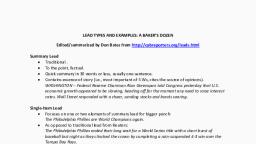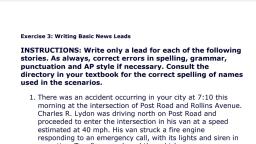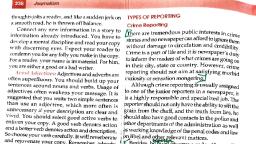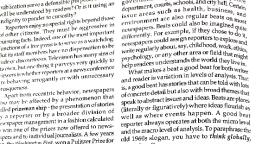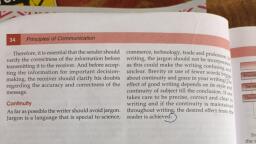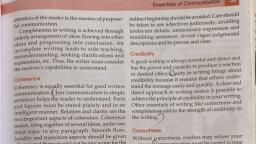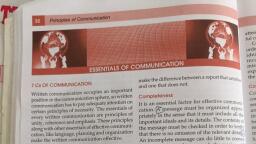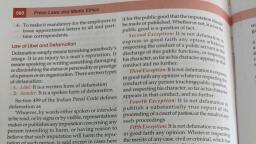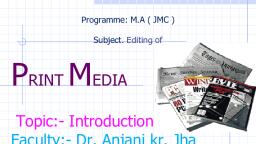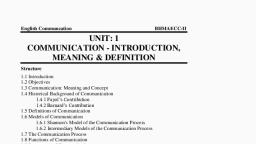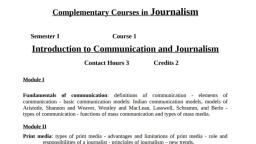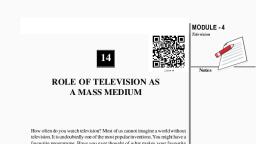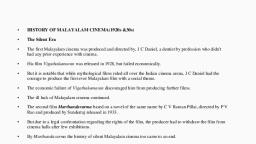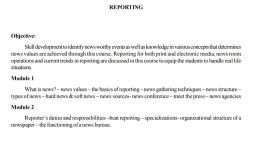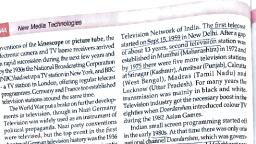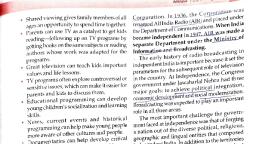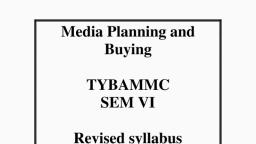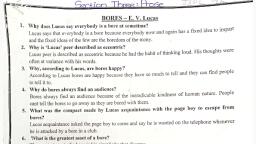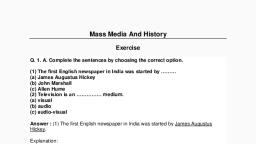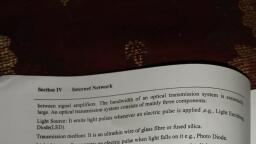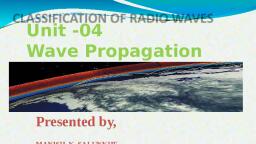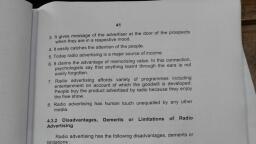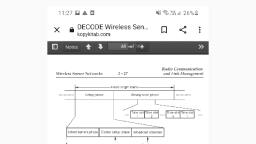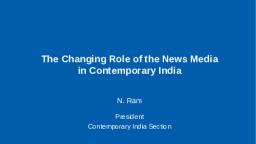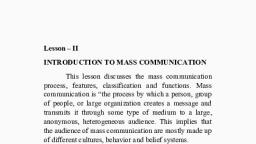Page 1 :
MODULE - 3, , Characteristics of Radio, , Radio, , 9, Notes, , CHARACTERISTICS OF RADIO, , You probably know the story of Sanjay in the Mahabharata who described the, war to Dritharasthtra who could not see. Sanjay could ‘see’ the war with his, divya drishti or his divine eye. Probably you can call Sanjay as the first ‘radio, broadcaster’., Suppose you are in a far flung area near the Himalayas on 26th January. You have, a radio with you and you tune into the running commentary of the Republic Day, Parade. You would know exactly what is happening in Rajpath in Delhi. The, commentator (like Sanjay in the Mahabharata) will describe the details of the, parade and as you listen, your imagination takes you to the Republic Day Parade., So that is radio for you. Wherever you are, you can listen to the near by radio, station. You can listen to music, news and other programmes. Now that you have, commercial radio stations, you can listen to round the clock chatting and music., And if you tune into All India Radio, almost every hour, you can listen to news and, other programmes., , OBJECTIVES, After studying this lesson, you will be able to do the following :, z, , explain the concept of radio broadcast;, , z, , describe the characteristics of radio broadcast;, , z, , enumerate the functions of radio broadcast;, , z, , list the limitations of radio broadcast., , 9.1 TERMS USED IN BROADCASTING, Let us first understand some of the common terms used in the medium of radio., z, , 116, , Audience: The group of people whom radio or media reaches for a particular, programme., MASS COMMUNICATION
Page 2 :
Characteristics of Radio, , MODULE - 3, Radio, , z, , Listener/s: A person or a group of people who form the target audience of, radio programmes., , z, , Broadcaster: a person who presents or announces programmes over radio, for the public., , z, , Broadcasting: any communication or transmission of any message or signal, to the public through electronic apparatus., , z, , Tuning into radio: You have to switch on your radio and tune into the station, you want to listen to., , z, , Live broadcast: It means a programme being broadcast directly without, any pre-recording or the sounds made at the moment of broadcast., , z, , Pre-recorded programme: The programme recorded on magnetic tape,, phonographic discs or compact disc for broadcasting it later., , z, , Script : The written copy of the words to be spoken during a radio programme., , Notes, , 9.2 OBJECTIVES OF RADIO, In the first module, you have learnt about the role of mass media. There, we were, referring to different forms of mass media like the print media (newspapers,, magazines etc.) and electronic media (radio, television etc.) These media have, functions which are common., Have you heard an advertisement on a popular brand of soap or shampoo ? What, does it communicate? Through that you have come to know about the brand, name of the soap or shampoo. You are informed or told that such and such a, product is available in the market.. That advertisement would also tell you what, benefits the brand offers., Let us take another example. The water supply department makes an announcement, on radio that there will be no water supply in your village or town the next day, morning. So you get ready to face that situation., Or a message on radio tells you that the following sunday is ‘polio immunisation’, day. If you have a small child in your home, with that information received through, radio, you decide that the child should be taken to be given polio drops., You might have heard rural programmes on agriculture on radio. Experts who, take part in that programme may explain what precautions are to be taken for a, , MASS COMMUNICATION, , 117
Page 3 :
MODULE - 3, , Characteristics of Radio, , Radio, , crop during a particular season. You learn to do a particular agricultural practice, using that information., , Notes, , Now think of the three examples given above. In the first case, you come to know, about the availability of a particular brand of soap or shampoo. It is for you to, decide what you want to do with that information. It just informed you., In the second and third example of the announcements about water supply and, polio immunization also, you are given information. You would agree that this, information is of great use., When it comes to the fourth example of a particular agricultural practice, the, information can educate a farmer who has no formal education or training in, agriculture., Let us take the example of ‘Gyanvani’. This is a radio station through which, educational programmes are broadcast for the benefit of learners., Now what do you understand from these examples about the role or function of, radio?, Firstly, radio informs, , Fig. 9.1: Listening to radio in a rural setting, , 118, , MASS COMMUNICATION
Page 4 :
Characteristics of Radio, , MODULE - 3, Radio, , Secondly, radio educates, , Notes, , Fig. 9.2: Students listening to an educational programme on radio, , Radio stations broadcast film songs. Don’t you tune into film songs on radio, for entertainment? Even the casual comments and announcements on radio, entertain us., So radio also entertains, , Fig. 9.3: Listening to music while driving, MASS COMMUNICATION, , 119
Page 5 :
MODULE - 3, , Characteristics of Radio, , Radio, , People tune into radio basically for these three things — for information, education, and entertainment. As radio is not expensive, for a large number of people in our, country, radio continues to be the only source of information, education and, entertainment. Those who cannot read or write or cannot see listen to radio news, for getting informed about what is happening around them., Notes, , However, the three objectives of radio are interrelated., Activity 9.1, Tune into your favourite radio station. Listen to the programmes, over a period of two or three days. Make a list of them and find out, if they were a source of information, entertainment or education., , INTEXT QUESTIONS 9.1, 1., , Given below is a list of descriptions. Relate them to the respective term, in the medium of radio., i), ii), iii), , A person or a group of people who form, the target audience of radio programmes., , ——————, , a person who presents or announces programmes, over radio for the public., , ____________, , any communication or transmission of any message, or signal to the public through electronic apparatus., , ____________, , iv) The programme recorded on magnetic tape,, phonographic discs or compact disc for, broadcasting it later., v), 2., , used, , The written copy of the words to be spoken, during a radio programme., , ____________, ____________, , You have learnt that one of the objectives of radio is to inform its listeners., Name the other two objectives and give your own examples of such, programmes on radio., , 9.3 CHARACTERISTICS OF RADIO, (i), , 120, , Radio makes pictures: Remember the example of the running commentary, on radio of the Repubic Day Parade in Delhi? As you heard the commentary,, you could visualize or ‘see’ in your mind what was being described. You, could actively ‘see’ pictures in your mind of the parade even as you listened, to the sounds of bands playing patriotic tunes or the sounds of marching and, commands. You use your power of imagination as you follow the running, commentary., MASS COMMUNICATION
Page 6 :
Characteristics of Radio, , MODULE - 3, Radio, , (ii) The speed of radio : Radio is the fastest medium. It is instant. As things, happen in a studio or outside, messages can be sent or broadcast. These, messages can be picked up by anyone who has a radio set or receiver which, is tuned into a radio station. If you have a television set and cable or satellite, connection you may be using a remote to get your favourite channel. These, days if you have a satellite connection, you can also receive radio signals of, various AIR stations. Otherwise your normal radio set gives the meter or, frequency on which various radio stations operate. You are tuned into that, station and listen to news that happened a few minutes earlier. On the other, hand, a newspaper gives you the previous days’ news. Of course television, can also cover events instantly. But television is a more complex medium, where you need light and cameras for any coverage., , Notes, , (iii) Simplicity of radio: Compared to all other media, radio is simple to use., As mentioned in the previous sections, radio needs very simple technology, and equipment., (iv) Radio is inexpensive: As it is simple, it is also a cheaper medium. The cost, of production is low and a small radio can be bought for as low a price as say, fifty rupees., (v) Radio does not need electric power supply: You can listen to radio using, dry battery cells even if you do not have electric power supply or a generator., So in a country like ours, where electricity has not reached everywhere,, radio is a great blessing., (vi) A radio receiver is portable: Don’t you move your radio set at home from, the living room to the kitchen or as you go out some where? You can’t do that, very easily with television. This facility of moving an object which is called, ‘portability’ gives radio an advantage. These days if you have a car and a, radio in it, you can listen to it as you drive or travel. Can you think of watching, television, when you drive ?, (vii) One does not have to be literate to listen to radio : Unless you are, literate, you can’t read a newspaper or read captions or text on television., But for listening to radio, you need not be literate at all. You can listen to, programmes or news in any language on the radio., (viii)For a majority of Indians in the rural areas, radio is the only source of news, and entertainment . Radio news can be heard anywhere using an inexpensive, receiver. Even the most economically backward sections can afford to use, the medium of radio., •, , Radio is the best medium of entertainment. It provide healthy, entertainment to the listeners., , •, , There is plenty of music of different types available to people., , •, , The popular types of music are classical, light classical, light, devotional,, folk and film music., , MASS COMMUNICATION, , 121
Page 7 :
MODULE - 3, , Characteristics of Radio, , Radio, , INTEXT QUESTIONS 9.2, , Notes, , 1., , Name any three characteristics of radio., , 2., , State whether the following statements are true or false :, i), , Radio makes pictures., , ii), , Radio is a slow medium., , iii), , Radio is an expensive medium., , iv) One has to be literate to listen to radio., v), , Radio is not a portable medium., , 9.4 LIMITATIONS OF RADIO BROADCAST, So far, we have learnt about the main strengths of radio as a medium of mass, communication. Now let us understand the limitations of radio., a., , A one chance medium : When you read a newspaper, you can keep it with, you and read it again. You have the printed word there and unless the paper, is destroyed it will remain with you. Suppose when you read a news item,, you do not understand the meaning of certain words. You can refer to a, dictionary or ask someone who knows to find out the meaning., Now think of radio. Suppose you are listening to a news bulletin in English, and you hear words that you don’t understand. Can you refer to a dictionary, or ask someone else for the meaning? If you stop to do that, you will miss the, rest of the news. You have to understand what is being said on radio as you, listen. You have only one chance to listen. What is said on radio does not, exist any longer; unless you record it. The words have momentary life. After, it is spoken, it disappears unlike a newspaper or a printed book. So that is, one of the greatest limitations or weaknesses of radio . It’s momentary nature, or to put it differently – radio is a one chance medium. A listener has just, one chance to receive the message and understand it., , b., , 122, , Radio has no visual images: Let us consider a news item on radio and the, same item on television. For example, the news about the devastating cyclone, Nargis that hit Myanmar in May 2008. Radio news talked about the intensity, of the cyclone, the number of deaths, details about property destroyed etc., However in the case of television, it showed the actual cyclone hitting the, country, visuals of properties destroyed, rescue operations and many more, details which could be seen. Now compare the two. A natural disaster like a, cyclone when seen on television is more effective than what you hear on, radio. It is said that “a picture is worth a thousand words”. It is also said that, MASS COMMUNICATION
Page 8 :
Characteristics of Radio, , MODULE - 3, Radio, , ‘‘seeing is believing’’. So when you see something, it is more believable than, what you hear. So having no visuals is a major limitation of radio., c., , Messages on radio are easily forgotten: The problem of not having visuals, leads to another limitation of radio. What is seen is often remembered and, may remain with us. For example if you have seen the fine visuals of the Taj, Mahal in Agra, it will remain in your memory. But what you hear is normally, forgotten fast. Probably you may remember what you have heard in a class, room if you found it interesting. But can you recall all the head lines of a news, bulletin you heard on radio? Normally, you don’t. So this is another limitation, of radio. Messages heard on radio are easily forgotten., , d., , Poor performance on the part of announcers : Presenters or participants, in a radio programme can be boring or uninteresting that it can result in, listeners switching off their radio sets. So listeners’ interest depends up on, how information or messages are presented., , e., , Radio broadcasts are of no use to people who have no sense of hearing, especially those with hearing disabilities., , Notes, , IN-TEXT QUESTIONS 9.3, 1., , List any three limitations of radio., , 2., , State whether the following statements are true or false :, i), , Radio gives visual images., , ii), , If the commentator is dull, his broadcast will also be dull., , iii), , Radio messages are easily forgotten., , iv) Radio is not a useful medium for people who cannot see., v), , A listener gets only one chance to listen and understand messages on, radio., , 9.5 WHAT YOU HAVE LEARNT, Characteristics of Radio, Concepts of radio broadcast, z, , common terms used in radio broadcast, , z, , listener, broadcaster, broadcasting, pre-recorded programme, script,, tuning into radio, , MASS COMMUNICATION, , 123
Page 9 :
MODULE - 3, , Characteristics of Radio, , Radio, , Objectives of radio, , Notes, , z, , to inform, , z, , to educate, , z, , to entertain, , inter related, , Charactersitics of radio, z, , radio makes pictures, , z, , fast medium, , z, , simple medium, , z, , inexpensive medium, , z, , portable medium, , Limitations of radio, z, , one chance medium, , z, , lacks visual images, , z, , messages on radio are easily forgotten, , z, , not useful for those with hearing disabilities, , 9.6 TERMINAL EXERCISES, 1., , Make a list of the common terms that you have learnt on radio broadcast and, explain each one of them., , 2., , Describe the objectives of radio with examples., , 3., , Radio as a medium has certain characteristic features. Explain., , 4., , Explain in detail the limitations of radio?, , 9.7 ANSWERS TO INTEXT QUESTIONS, 9.1 1. i) listener/s, ii) broadcaster, iii) broadcasting, iv) pre-recorded programme, vi) script, 2. entertain; educate. Examples will vary from learner to learner., , 124, , MASS COMMUNICATION
Page 10 :
MODULE - 3, , Characteristics of Radio, , Radio, , 9.2 1. Refer to Section 9.3., 2. i), , True, , ii) False, iii) False, , Notes, , iv) False, v) False, 9.3 1. Refer to Section 9.4., 2. i) False, , ii ) True, , MASS COMMUNICATION, , iii) True, , iv) False, , v) True, , 125

